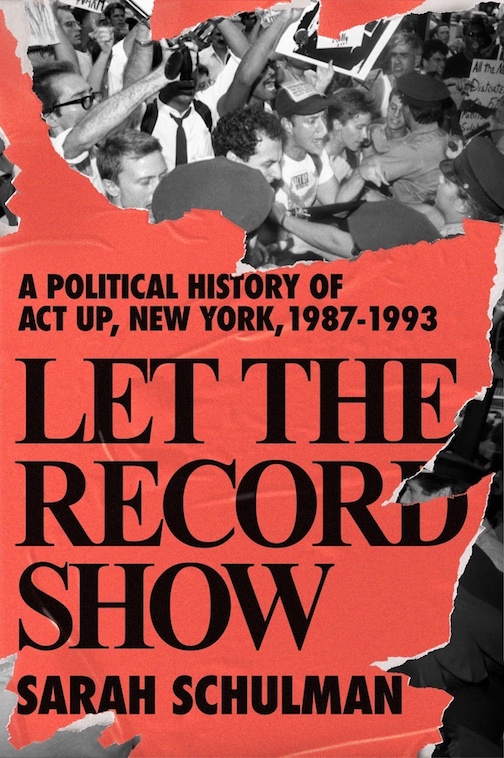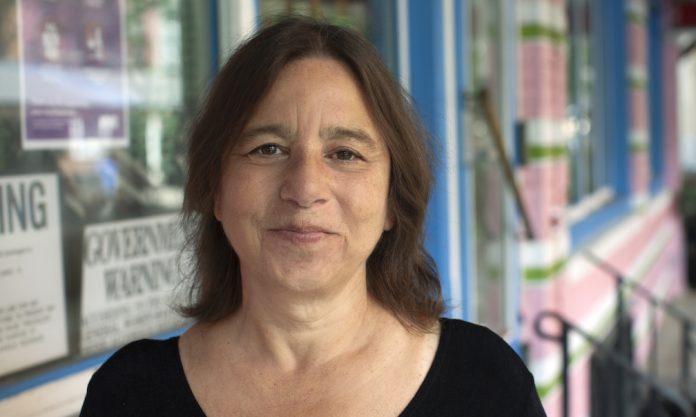[This article appears in the May/June 2021 issue of Boston Spirit magazine.]
Novelist, playwright, screenwriter, journalist and activist Sarah Schulman wrote about the AIDS experience in New York in her landmark novels “People in Trouble” (1990) and “Rat Bohemia” (1995). More recently, her nonfiction work “The Gentrification of the Mind: Witness to a Lost Imagination” chronicled the effect AIDS had on her own Lower East Side neighborhood. For her 20th book, “Let the Record Show: A Political History of ACT UP, New York, 1987–1993,” out in May from Farrar, Straus and Giroux, Schulman meticulously corrects misinformation about ACT UP (AIDS Coalition to Unleash Power) and offers a blueprint for historians and activists today.

That’s what Schulman, who was part of ACT UP New York, wants most for readers to take from the book. “ACT UP did not function on consensus. People were not forced into agreeing on analysis, strategy or even language. The only principle of unity was direct action to end the AIDS crisis. … If you fit that, you could do whatever you wanted to do. Today, there is a tendency to force conformity. That has never worked. It’s not a question of belief; if you want to be effective, people must be able to be where they are,” says Schulman.
“Let the Record Show” details how ACT UP’s nonhierarchy allowed members to tackle various crucial actions based on their own areas of expertise or interest, often undergoing crash courses in science, organizing and public-relations skills. Some members strategized; some organized demonstrations or researched experimental drugs; others worked on less visible but vital tasks such as how people with AIDS could access insurance. “Different constituencies adopted different strategies based on their positions,” says Schulman. Those with connections and access might pick up the telephone and contact a colleague; those who did not, and these were most members, figured out that unconventional methods might take much longer but ultimately were effective.
These lessons, Schulman hopes, will be useful for contemporary activists. “No matter who you are, you can beat the system if you are effective and well organized and have awareness of how you are situated because that’s what determines strategy,” she says.
Schulman, professor at the College of Staten Island, also teaches in the summer writing program at Provincetown’s Fine Arts Work Center. The workshops are virtual this year, but next summer she’ll return to Provincetown for a production of her play “The Lady Hamlet” at the Provincetown Theater.
Schulman wanted ACT UP’s activists to tell their own stories. She personally conducted 184 interviews with individuals who were part of the collective. Some 140 of those interviews with people from all backgrounds and all walks of life are represented in her book.
“One of the things that bothered me about the whitening and narrowing of ACT UP’s history is that it was being reduced to a handful of individuals. What made ACT UP successful was how diverse it was,” Schulman says, citing, among other committed participants, the straight women “who had no experience with AIDS but didn’t want to be bystanders.”
Women in ACT UP “were often the theoreticians of the movement. They were often responsible for so much of its expansion” because many, like Schulman herself, had experience with other social change efforts especially those centered on reproductive rights. Other members “came from antifascist groups in Latin America, or the Mexico City student movement, or CORE, or small, leftist groups. … There is a significant difference [in activist groups] between entirely white male and predominately white male,” she says. “When women and people of color participate, they have enormous impact.”
Schulman’s comprehensive book is part of a long-standing project that documents New York’s ACT UP. It began in 2001 when Schulman and collaborator Jim Hubbard “realized that ACT UP had missed the switch to the Internet. None of our materials were digitized, so if you searched, you would not find anything. The memory of ACT UP was disappearing,” Schulman says. The interviews they conducted for the ACT UP oral history project can be found at actuporalhistory.org.
Hubbard also preserved 2,000 hours of archival footage. Their documentary, “United in Anger: A History of ACT UP,” which Schulman produced and Hubbard directed, was released to audiences via YouTube. But “film is limited to what you have footage of,” says Schulman, “and there was so much more to say.”
With the addition of rich material in “Let the Record Show,” Schulman’s aim was to “make it a book that would be meaningful to people today who are activists and not just about nostalgia. ACT UP is one of the most recent social movements that was in some ways successful. It’s important to look at what was successful and what failed so it can be applicable to today.”
“The message of ACT UP is that regular people can change the world,” she says. “People who are living in a state of illegality, who have no rights, who’ve been abandoned by their families can change the world. I’m lucky I was in a movement that accomplished that so I know it’s possible. And I want that information to be out there.”
Not a subscriber? Sign up today for a free subscription to Boston Spirit magazine, New England’s premier LGBT magazine. We will send you a copy of Boston Spirit 6 times per year and we never sell/rent our subscriber information. Click HERE to sign up!









